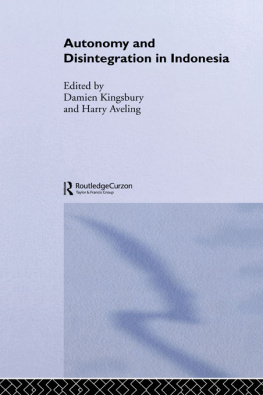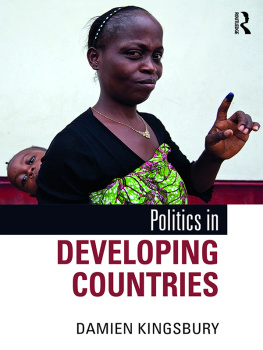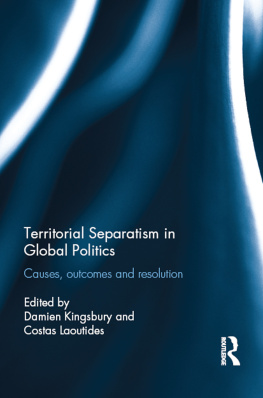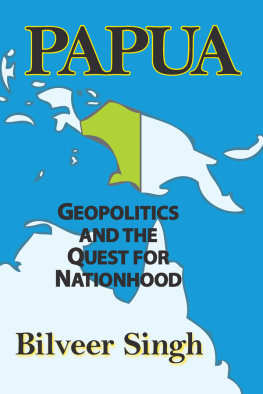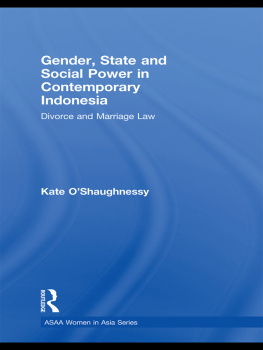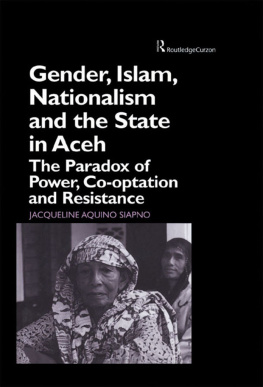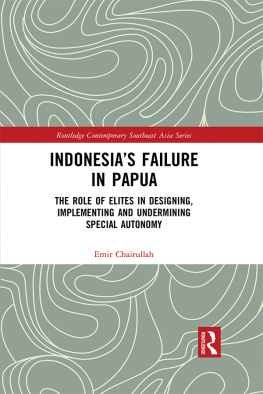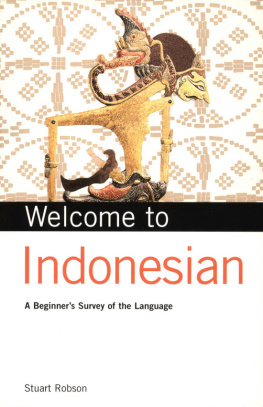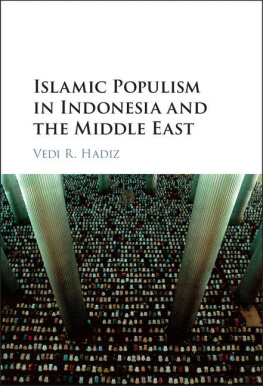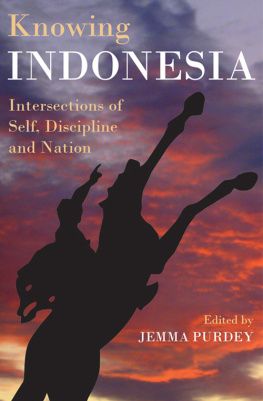Autonomy and Disintegration in Indonesia
Fragmentation in Indonesia is by far the most critical issue now facing the state. This book analyses social unrest, autonomy and separatism in the wake of the Indonesian economic crisis, placing them in the context of state evolution, and looking at the competing aims of economic and political globalisation with local agendas.
Topics covered include Indonesian nationalism in historical perspective, identity and the nation-state, NGO activism, and case studies from Aceh, Papua, East Timor, and Sumatra.
Damien Kingsbury is Associate Head of School, Social and International Studies, Deakin University, Australia.
Harry Aveling is Deputy Head of the School of Social Sciences, La Trobe University, Melbourne, Australia.
Autonomy and Disintegration in Indonesia
Edited by
Damien Kingsbury
and
Harry Aveling
First published 2003
by RoutledgeCurzon
2 Park Square, Milton Park, Abingdon, Oxon, OX14 4RN
Simultaneously published in the USA and Canada
by RoutledgeCurzon
270 Madison Ave, New York NY 10016
RoutledgeCurzon is an imprint of the Taylor & Francis Group
Transferred to Digital Printing 2005
2003 Selection and editorial matter, Damien Kingsbury and Harry Aveling;
individual chapters, the contributors
Typeset in Times by
Integra Software Services Pvt. Ltd, Pondicherry, India
All rights reserved. No part of this book may be reprinted or reproduced or utilised in any form or by any electronic, mechanical, or other means, now known or hereafter invented, including photocopying and recording, or in any information storage or retrieval system, without permission in writing from the publishers.
British Library Cataloguing in Publication Data
A catalogue record for this book is available
from the British Library
Library of Congress Cataloging in Publication Data
A catalog record for this book has been requested
ISBN 0415297370 (hbk)
ISBN 0415338271 (pbk)
In memory of Herb Feith, scholar, humanitarian, friend
Contents
PART I
Themes and issues
PART II
The regions
Contributors
Edward Aspinall is a Research Fellow at the Research School of Pacific and Asian Studies, Australian National University, Canberra.
Harry Aveling is Deputy Head of the School of Social Sciences, La Trobe University, Melbourne, Australia.
Richard Chauvel is Director of the Australia Asia Pacific Institute and Associate Professor at the Victoria University, Melbourne.
Elizabeth Collins is Director of the Southeast Asian Studies Program, Ohio University.
Ismet Fanany is a Senior Lecturer in the School of Social Inquiry, Deakin University, Melbourne.
Gary Goodpaster is the former Chief of Party of the Partnership for Economic Growth Project, Jakarta.
Paul James is Professor of Globalism and Cultural Diversity at the Royal Melbourne Institute of Technology.
Damien Kingsbury is Associate Head of School, Social and International Studies, Deakin University, Australia.
Ann Kumar is a Reader in the Asian History Centre, Australian National University, Canberra.
Ruth McVey is a Emeritus Reader in Southeast Asian Politics, School of Oriental and African Studies, University of London.
David Ray is Economic Advisor USAID-funded Partnership for Economic Growth Project, Ministry of Industry and Trade, Government of Indonesia.
Rendra is a major Indonesian poet and dramatist.
Minako Sakai is Program Co-ordinator of Indonesian Language and Culture at the Australian defence Force Academy, University of New South Wales.
Rizal Sukma is Director of Studies at the Centre for Strategic and International Studies, Jakarta.
Ratapan Seorang Penyair/A poets lament
Rendra/translated by Harry Aveling
RATAPAN SEORANG PENYAIR
Ya Allah Yang Maha Rahman,
Hambamu menuliskan doa ini di kala hujan, di malam hari. Rumpun bumbu bergoyang-goyang di dalam kegelapan, tampias hujan menerpa kaca jendela, kesuburan dan kesejukan melimpah di atas tanah. Ya, Allah, keagungan alam purba yang penuh rahasia terungkap di depan mataku. Allah Maha Agung. Allah Maha Indah.
Tetapi segera aku terkesiap. Terbayang dalam pikiran hutan di Kalimantan bergetah darah. Kebun nilam di Aceh berbunga luka-luka. Di Ambon ombak lautan berwarna merah dan menjelma menjadi kobaran api. Malam ini tak ada nyanyian serangga, tak ada pula himbauan dari burung-burung malam. Hanya suara hujan yang berirama dan kadang-kadang bermelodi karena angin menerpa atap, kaca-kaca jendela dan daun-daun pephononan. Namun tiba-tiba aku mendengar pekik pilu cenderawasih yang terluka menggelegar, tersangkut di ranting pohon di hutan Irian Jaya.
Ya, Allah, tidak mampu lagi aku bersyair tentang keidahan alam raya. Kata-kata dalam buku filsafat yang tegeletak di meja berubah menjadi kepala-kepala yang dipancung. Desa-desa yang ramah dan hangat kini menjadi gambaran ketidakpastian, karena ruh dan iman telah menyerah kepada fitnah. Kehilangan pendirian.
Ya, Allah, ruh dan iman kami sebagai bangsa telah compang-camping, berpusing-pusing dalam prahara dan akhirnya menjadi sampah sejarah.
Tiga puluh dua tahun kami telah mengazab diri kami sendiri, rela ditindas oleh pemerintah, para politisi, para birokrat, dan teknokrat yang melecehkan intelek-tualitas, nilai-nilai moral dan budaya. Menjarah harta bangsa, menjarah hak azasi manusia, memonopoli informasi, memperbodoh rakyat, menyeragamkan keanekaan kehidupan, semuanya saja, boleh dilakukan, asal memperkuat kedudukan penguasa. Ya, Allah, krisis nilai merajalela. Dan akhirnya: pendangkalan kehidupan.
Hati nurani masyarakat dicekik habis-habisan. Erosi dan polusi di alam dan di kehidupan sehari-hari, selalu meningkat, selalu menjadi-jadi. Akal sehat merosot menjadi tipu daya, moral disapu ke kolong jembatan, dan agama menjadi sekedar pakaian dan lencana.
Pembangunan yang vertikal ternyata hanya menguntungkan penguasa dan membuat bangsa menjadi miskin serta tidak mampu berdayaMenjadi sampah, kehilangan kemanusiaannya. Sedemikian tidak berdayanya bangsa kami, sehinggi kini, di saat reformasi ini, kami menjadi monster bagi diri kami sendiri.
Kami berdendam, menuntut keadilan, tetapi kami tidak mampu berlaku adil dan memakai cara-cara yang adil. Mata gelap. Kalap. Kekerasan dan amuk merajalela di mana-mana. Kami gampang menjadi korban rekayasa. Bergairah mendapat kesempatan untuk melepaskan nafsu menjadi gandarwa, sebab kami memang sudah menjadi sampah kering disulut api.
Ya, Allah, kami sudah kehilangan kemanusiaan. Kami menjadi makhluk yang kehilangan hati nurani, karena kami melupakan iman.
Memang selama tiga puluh dua tahun sudah pemerintah Orde Baru menjarah kedaulatan rakyat. Para cukong, yang menjadi begundalnya, menjarah kekayaan bangsa. Dan aparat keamanan telah menjarah keamananLaluapakah kami harus mencontoh mereka dan ikut-ikut menjarah apa saja yang ada di depan mata, termasuk menjarah hati nurani kami sendiri?
Ya, Allah Maha Rahman, kami lari berlindung kepadaMu. Kami ingin melepaskan diri dari contoh-contoh buruk yang telah dibiasakan oleh para pemimpin kami. Kami ingin melepaskan diri dari sihir tabiat-tabiat jahat mereka. Kami ingin mendapatkan hati nurani kami kembali. Oleh karena itu kami kembali kepada iman dan lalu bersujud kepadaMu, Ya Allah Yang Maha Kuasa

